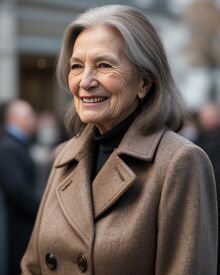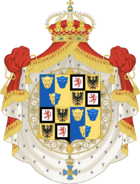Carilla of Durland
This article is incomplete because it is pending further input from participants, or it is a work-in-progress by one author. Please comment on this article's talk page to share your input, comments and questions. Note: To contribute to this article, you may need to seek help from the author(s) of this page. |
| Carilla | |
|---|---|
| Princess of Leps | |
 Carilla in 2022 | |
| Princess of Durland | |
| Tenure | 29 August 1972 - present |
| Investiture | 1 September 1972 |
| Predecessor | Garmaanas II |
| Heiress apparent | Ingdil |
| Prime Ministers | Saamn Lansduin Clarwin Gjardeer Unes Krijsdor Jeren Draris Ellee Asnee Eelar Lordann Gurver Deena |
| Born | Carilla Theyra Emele 4 August 1946 Herran, Durland |
| Spouse | Olar Wismar (m. 1975) |
| Issue | Ingdil, Hereditary Princess of Durland Prince Ludan, Duke of Geillen |
| House | Leps |
| Father | Garmaanas II |
| Mother | Countess Theyra Jonaara |
| Religion | Durlish Orthodox |
| Military career | |
| Allegiance | |
| Service/ | Home Guard |
| Years of service | 1967–1972 |
| Rank | Sub-lieutenant |
| Princely Family of Durland |
|---|
|
| * Member of the Durlish Princely House |
Carilla (Carilla Theyra Emele; born 4 August 1946) is Princess of Durland, having succeeded to the throne on 29 August 1972.
Carilla was the first-born child and only daughter of Prince Garmaanas and Princess Theyra. At the time of her birth, she was second in the line of succession, behind her father. On the birth of her brother, Prince Sarnar, in 1955, she was displaced in the line of succession due to cognatic primogeniture. However, with the introduction of absolute primogeniture in 1959, she was returned to second in line ahead of her younger brother. Carilla was educated at the Jora School and studied for periods at the University of Herran.
Following the death of her grandfather Garmaanas I in 1962, Carilla became hereditary princess on the succession of her father. However, due to her father's illnesses (he suffered from severe asthma), she served as regent periodically until her accession. Carilla became princess following her father's death in 1972. She subsequently married commoner Olar Wismar, becoming the first monarch to marry a commoner and the first to marry whilst on the throne. Her daughter, Ingdil, is heir apparent.
Carilla is the longest-reigning monarch in recent Durlish history, having reigned for 51 years as of 2023.
Reign
Although Carilla became princess in August 1972, she had been prepared for the role due to her acting as regent for her father. Her final regency was from 27 July 1972 until her father's death on 29 August the same year.
On succeeding to the throne, Carilla became the first princess regnant of Durland. She was sworn in during a meeting of the Council of State in the Royal Palace of Herran on 1 September 1972. The same day, she addressed a joint session of the two houses of Parliament for the first time.
As a young monarch, albeit one that had experience as regent, Carilla faced distrust and ambivalence from many in government. Prime Minister Saamn Lansduin was a notable critic of the princess in private, although he maintained the façade of respect in public. Records released following his death detail his poor regard for the new princess, his attempts to avoid scrutiny by the monarch, and a sustained campaign of frustrating her role in state affairs. Lansduin was dismissed by the princess in 1974 when he lost a no confidence motion in Parliament, and was replaced with the more amiable Clarwin Gjardeer.
In 1975, Carilla married businessman Olar Wismar. They had previously met four years earlier, but their relationship was forbidden by the Prince due to his status as a commoner. The couple rekindled their relationship in 1973. He became the first Prince Consort in Durland's history. Carilla subsequently became the first reigning monarch to marry whilst on the throne. During these pregnancies her husband served as regent.
As constitutional monarch, Carilla is the foremost representative of the state. As such, the princess has undertaken various formal and informal overseas trips. In 1981, Carilla became the first Durlish monarch to visit Garindina, where she met Emperor Alexander III and Emperess Catherine. As commander-in-chief of the armed forces, the princess has also attended various military parades and ceremonies overseas.
Controversy
Throughout her reign, Carilla has maintained an active role in Durlish politics, as per her constitutional position. She has appointed several informateurs to led negotiations in cabinet formations, and has also played a minor role in assisting in these negotiations. However, Carilla has maintained a strict non-political approach to her duties and little is known about her own private beliefs. She has nonetheless courted controversy at different points during her reign. The most prominent example is the "Family Order Crisis," during which she was criticised for awarding royal family orders to a number of Social Democratic ladies of the court whilst overlooking Conservative ladies. The crisis was averted when the Princess apologised for "sadly missing many talented ladies of the court" and subsequently awarding the order.
Jubilees
In 1997, Carilla celebrated her Silver Jubilee. A series of events to mark the occasion ran throughout the year. A service of thanksgiving was held in August at the Cathedral Church of Herran, attended by the Princess, Prince Consort, members of the Princely Family, politicians, and members of civic society. The Princess Carilla Silver Jubilee Fund was also established to fund the arts and entertainment, as well as to provide scholarships for disadvantaged people. Carilla's Ruby Jubilee was similarly marked in 2012, with a series of street parties held to mark the event. For both jubilees, commemorative medals were released and awarded to individuals in the order of precedence, members of the armed forces and emergency services, and other select civil servants.
In 2022, Carilla celebrated her Golden Jubilee. This jubilee was more muted compared to previous jubilees; a speech by the Princess on New Years Day 2022 included the death of her father and her "continued grief." As she does every year, she marks her accession with "private reflection and worship" and "time to remember [her] father." The Golden Jubilee Medal was released with a wider eligibility, with charity workers prominent amongst recipients.
Marriage and children
Carilla first met Olar Wismar in 1971 when the then-princess regent hosted a reception at the Royal Palace of Herran for business leaders. Wismar, who was working in the manufacturing industry at the time, later said that the two "immediately found that [they] had a lot in common," although there was no suggestion of romance. Subsequent meetings, both formal and informal, quickly led to the two falling in love. In December 1971, Carilla presented Wismar to her parents, who were not impressed in his background and commoner status. Prince Garmaanas ordered Carilla to break off the relationship; whilst she and Wismar agreed to "pause" their plans, neither intended to wholly separate from the other.
On Garmaanas' death the following year, the two rekindled their relationship and were seen in public for the first time together in February 1973. Due to the princess' new role and increased responsibilities, the two did not announce their relationship immediately, it becoming public knowledge only in August 1973 after much speculation. In June 1974, the Royal Palace announced that the princess and Wismar would marry, and the marriage ceremony held in Herran on 14 June 1975. Earlier that day, Carilla granted Wismar the title of prince and the style of Highness. On their marriage, he became the first Prince Consort of Durland.
In 1976, Carilla gave birth to her first child Princess Ingdil. This was followed by the birth of Prince Ludan in 1979. Ludan was born via caesarean section due to complications. During both pregnancies, Prince Olar served as regent at various points, especially during the latter pregnancy.
Children
| Name | Birth | Marriage | ||
|---|---|---|---|---|
| Date | Spouse | Issue | ||
| Princess Ingdil, Hereditary Princess of Durland | 19 June 1976 | 16 August 2003 | Count Rardan ne Maatrel | Prince Genran Princess Enna |
| Prince Ludan, Duke of Geillen | 4 February 1979 | 13 May 2006 | Helana Gabella | Princess Mare-Lana Prince Erril |
Titles, styles, honours and arms
Titles and styles
At birth, Carilla was styled "Her Highness The Princess Carilla of Durland". On the accession of her father on 19 June 1962, she became known as "Her Highness The Hereditary Princess of Durland". The title Princess of Leps was added when her father created it to commemorate the 90th anniversary of the accession of Farnar II in 1966. Since her accession on 29 August 1972, she has been styled "Her Highness The Princess of Durland."
Carilla's full title as princess of Durland is: Her Highness The Princess Carilla, Princess and Constitutional Sovereign of Durland, Princess of Leps".
Honours
National honours
 Grand Master of the Order of Prince Jora
Grand Master of the Order of Prince Jora Grand Master of the Order of Leps
Grand Master of the Order of LepsGrand Master of the Order of the Two Lions
Grand Master of the Order of the Crown
Arms
As heir to the Durlish throne, Carilla's arms were the Durlish coat of arms differenced with a label of three points argent (white). Originally these arms did not feature the Order of Prince Jora circlet, to which she was appointed in 1963. She used an Iberian escutcheon, which is used by women in Durlish heraldry. Surmounting the mantle was the heraldic crown of the heir to the throne, decorated with three half-arches.
Following her accession to the throne, the label on her arms was removed. The escutcheon was also changed from the Iberian shield to a convex heater, which is generally used by men. Whilst Carilla is not technically elegible for such an escutcheon (as a woman possessing arms in her own right), she nonetheless assumed the arms of the state, which use this escutcheon. The crown of the heir was changed to that of the monarch's, featuring five half-arches rather than three.
Arms depicting other orders within the Honours of Durland are recognised; these, however, are generally used in relation to the monarch's role as Grand Master of the relevant order. Depictions of these variants are found in the chapels of each of the respective orders.




